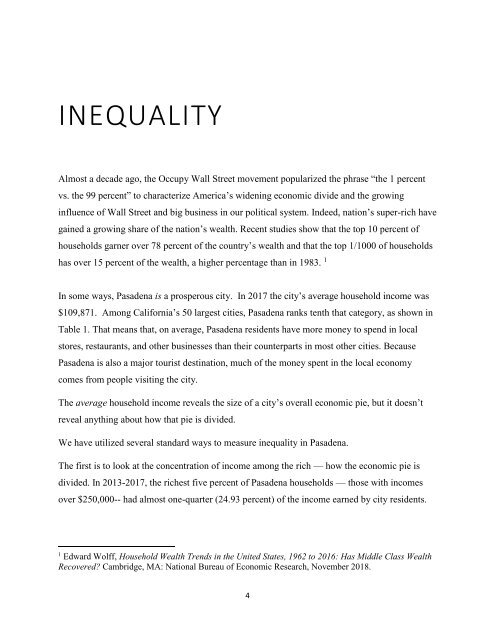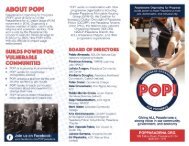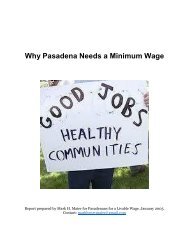Pasadenas-Tale-of-Two-Cities-2019
You also want an ePaper? Increase the reach of your titles
YUMPU automatically turns print PDFs into web optimized ePapers that Google loves.
INEQUALITY<br />
Almost a decade ago, the Occupy Wall Street movement popularized the phrase “the 1 percent<br />
vs. the 99 percent” to characterize America’s widening economic divide and the growing<br />
influence <strong>of</strong> Wall Street and big business in our political system. Indeed, nation’s super-rich have<br />
gained a growing share <strong>of</strong> the nation’s wealth. Recent studies show that the top 10 percent <strong>of</strong><br />
households garner over 78 percent <strong>of</strong> the country’s wealth and that the top 1/1000 <strong>of</strong> households<br />
has over 15 percent <strong>of</strong> the wealth, a higher percentage than in 1983. 1<br />
In some ways, Pasadena is a prosperous city. In 2017 the city’s average household income was<br />
$109,871. Among California’s 50 largest cities, Pasadena ranks tenth that category, as shown in<br />
Table 1. That means that, on average, Pasadena residents have more money to spend in local<br />
stores, restaurants, and other businesses than their counterparts in most other cities. Because<br />
Pasadena is also a major tourist destination, much <strong>of</strong> the money spent in the local economy<br />
comes from people visiting the city.<br />
The average household income reveals the size <strong>of</strong> a city’s overall economic pie, but it doesn’t<br />
reveal anything about how that pie is divided.<br />
We have utilized several standard ways to measure inequality in Pasadena.<br />
The first is to look at the concentration <strong>of</strong> income among the rich — how the economic pie is<br />
divided. In 2013-2017, the richest five percent <strong>of</strong> Pasadena households — those with incomes<br />
over $250,000-- had almost one-quarter (24.93 percent) <strong>of</strong> the income earned by city residents.<br />
1<br />
Edward Wolff, Household Wealth Trends in the United States, 1962 to 2016: Has Middle Class Wealth<br />
Recovered? Cambridge, MA: National Bureau <strong>of</strong> Economic Research, November 2018.<br />
4





